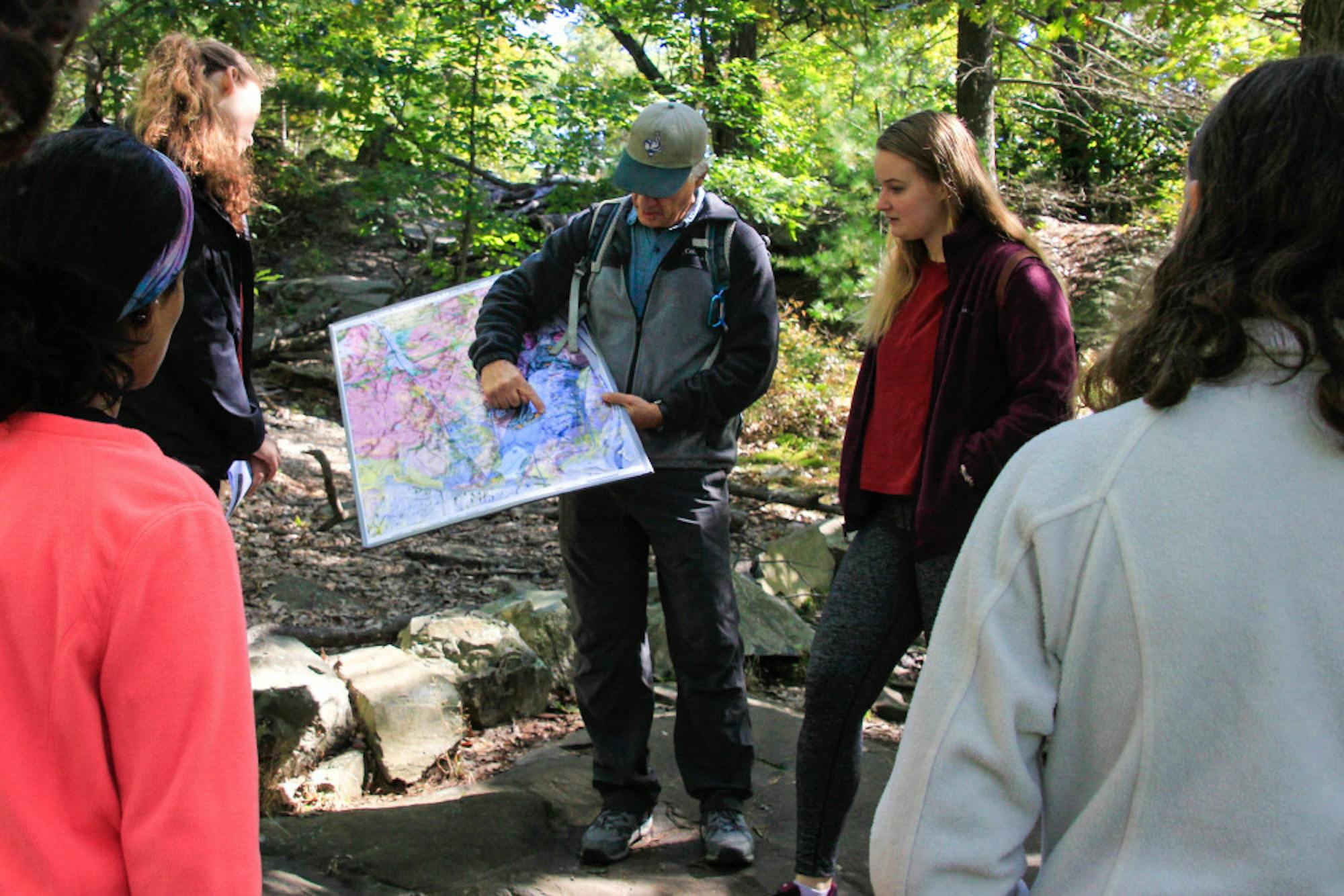Jack Ridge, professor of glacial and quaternary geology and geomorphology in the Department of Earth and Ocean Sciences, led a group of students through the Middlesex Fells Reservation last Friday to learn about geological formations.The Environmental Studies Program organized the trip, which was part of its Environmental Escapades series.
According to Ridge, this was his first time leading an off-campus trip. The purpose of his tour was to show students the geological structure of a small portion of the Middlesex Fells, near Bellevue Pond. Ridge began the tour with a crash course in basic geological concepts. The group then followed the Skyline Trail, as Ridge showcased the Fells' many different types of rocks and how to identify them. He also taught students how to identify areas of weathering, how to tell which direction a glacier was moving during the last glaciation and how to determine the relative age of the rocks.
Ridge noted that the field trip had something for students of all geological experience, as some students were new to the field while others had previously taken classes with him. He explained that the trip presented an opportunity for those who had only studied geology in a textbook to see it in a field setting.
“I think [students] get an appreciation for what geology is and for what’s out in the field,” he said. “A lot of students walk through the Fells and see a rock, but they’re not paying attention to ‘This one looks different than the one over there, and what does that mean?’ It’s a very different thing than what most people are used to because it’s not [like] when you have Earth Science [class] in middle school.”
The area of land covered by last Friday’s tour was part of a large geological map of the Fells that Ridge compiled between 2006 and 2017. In the future, he hopes his map can be used to create an interactive, self-guided tour on mobile devices, but for now, his guided tour is resonating with students who participated.
“I loved [the tour],” Iffat Nawsheen, a first-year, said. “I think a big part of what I love about Tufts … is I realize just how passionate and interested every professor is in the field of study that they’re in."
Nawsheen also noted that Ridge's expertise and academic enthusiasm shined through.
"Having a tour guide who is in love with what they are doing and what they are talking about is really different than just a tour guide who's doing it as a job,” Nawsheen said.
Tyler Stotland, who organized the trip, shared a similar sentiment.
“I was really happy about how engaged people were and [that they were] asking lots of questions,” she said.
According to Stotland, a sophomore, the trip's capacity filled up under 24 hours after she shared the information to Facebook. Despite the high interest, the number of participants was limited due to the carrying capacity of the van and the budget for the program, she said.
“The [Earth and Ocean Sciences] Department has a pretty small budget for these kinds of events, and since we want to do two to three a semester, that means that each one has to be pretty low-cost,” Stotland said.
Assistant Director and Program Administrator of the Environmental Studies Program Sara Gomez concurred and recognized the opportunity for the program’s expansion.
“We have limited resources, so my hope is to continue to at least be able to offer 2-3 trips/events per semester,” Gomez told the Daily in an email. “I would love to collaborate with [other departments] to be able to expand the scope and capacity of the trips.”
The Environmental Escapades series was started about three years ago, according to Gomez, who explained that the trips began as a way for environmental studies students to be exposed to nature and for those outside the major to get involved with environmental causes.
“I wanted to complement the environmental studies curriculum by bringing our students outside of the classroom and to engage others that may not want to major in our program but are interested in environmental issues,” Gomez said. “My hope is that through [these] trips and other initiatives we continue to build a strong environmental community on campus.”
Stotland noted her positive experience with the series and expressed excitement for future trips.
"I hope that this event and future Environmental Escapades events can help people feel connected to where they are," Stotland said. "I was excited about this program in the first place, and I’m excited about it now because it helps bring environmentalism to a broader picture. It's more about feeling connected to where you are and feeling a sense of place.”
Students embark on geology-focused escapade to the Fells

Professor of Earth and Ocean Sciences Jack Ridge shows students an outcrop of rocks during a tour of the Middlesex Fells Reservation, part of the Environmental Escapades series, on Oct. 5.





